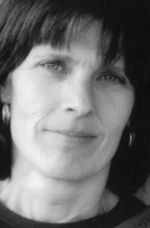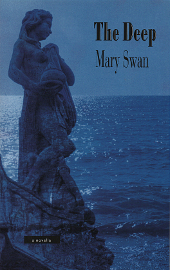The Porcupine's Quill
Celebrating forty years on the Main Street
of Erin Village, Wellington County
BOOKS IN PRINT
The Deep by Mary Swan
The Deep is a vivid, accomplished tale of twin sisters caught up in the mania that was World War I. The year is 1918. Esther and Ruth, living a life privileged and protected, embark upon a journey to France that will profoundly affect their relationship with each other, those they leave behind and those they have yet to meet.
In France, their experiences bring them face to face with the horrors and tragedy of war, but also expose them to a world alive with drama. Mary Swan’s ability to create the images and atmosphere of this strange world is her greatest strength.

2002—Commonwealth Best First Book / Canada & Caribbean,
Shortlisted
Review quote
‘In the present literary-critical climate, if this book receives any attention at all (which is, alas, by no means certain), it is likely to be praised for presenting women’s experience and attitudes in what is almost invariably regarded as an all-male preserve. This would not be inaccurate, but it would be hopelessly beside the point. What ought to be emphasized is the fact that The Deep Mary Swan’s first book-length publication, introduces a potentially major writer to the Canadian scene. This novella is faultlessly written, artfully controlled, unforgettable. The world of 1918 is splendidly evoked, but, as we read, we should be responding to the sheer beauty of Swan’s unostentatious but crisp and impeccable prose. A brilliant debut. Read it.’
—W J Keith, Canadian Book Review Annual
Review quote
‘The narrative is electrified by [an] audacious double voice, along with an equally audacious structural complexity. Swift movements through time and space and shifts in perspective among a small army of supporting characters might easily have led to confusion. Yet the care and control of Swan’s writing, the sustained patterns of her imagery and the sheer beauty of her prose clarify everything that is essential to the story while preserving its central mystery.’
—Andrea Barrett, The New York Times
Review quote
‘The subtlety and compression of this writing are rare indeed.... Savour this gem, and watch for Swan’s next.’
—Jim Bartley, Globe & Mail
Review quote
‘There is something sexy about the alienating elegance of Swan’s prose. Terrible events at the battlefront are referred to alongside ordinary events in hotels and bars. But it is the objects, the materials of daily life, that get the most attention.’
—Natalee Caple, eye
Review quote
‘There’s lots of ... shifts in this wonderful feat of fragmentary storytelling which never loses its unity of focus in the powerful image of the twins who share one mind and soul. The dramatic tension builds, and the pages turn, because we sense that each of this multitude of voices knows more than we could guess about the story’s end. The Deep has a beautiful consistency of tone that evokes both its time and its two main characters. And since we never seem to learn the lesson, it speaks to us yet again about the tragedy of war.’
—Carole Giangrande, Carole’s Booktalk
Discussion question for Reading Group Guide
1. While describing a typical dance at their camp, the sisters write that ‘...sometimes there are terrible fights. All for two minutes’ shuffle around the floor with a woman in your arms. For that’s what we are at these times, Women, and not ourselves at all’ (66). What does this comment mean? If ‘Women’ is not the sisters at all, then who are they? Why did the sisters choose to capitalize ‘Women’, and what is the difference between uppercase Women and lowercase?
2. The twins seem to hold an aversion to modernity; for example, they describe the war as ‘a terrible machine, carried along by its own momentum’ (67). Are the twins trying to return to a simpler, non-violent and more wholesome time? Do you think that fragmentation and isolation -- what the sisters undergo later in the novella -- are particular symptoms of modernity and technology? Are the sisters right to search for a simpler time or is that a hopeless project?
3. On p. 68, Hugh and the twins watch several women chatting by an old well. Hugh remarks, ‘This should be what’s real.... What’s been forever, what will go on, long after we’re gone.’ The twins ‘knew he was thinking of the deep grooves ... in the grey stone, how many hundreds of years it had taken bucket ropes to make them. But what [the twins] also noticed was the way the chatting group seemed to register the other’s presence, without pausing in their conversation or turning their heads.... Nothing, to [the twins’] eyes, would explain why the little group turned away from [the other woman], without actually moving.’ Why did the twins know that Hugh spoke of the well and not the women -- and do you think the twins were correct in their assumption? Does this incident mark a difference between men and women? How does this short moment amplify or complicate the greater conflicts in the novella?
4. What role does water play in The Deep? How does the presence of water affect the twins and their relationship? One moment ‘there was something magical in that pale green underwater light, in the fronded weeds that waved and beckoned us down,’ but the next moment ‘there was, suddenly, a moment of cold panic’ (71). Why does Swan have water evoke these different emotions?
5. How does The Deep offer a new perspective on World War I?
6. ‘It was a balance, thinking about home; it was necessary’ (50). Soldiers at camp often spoke of ‘another kind of life’, or their experiences back home. What is the importance of storytelling when experiencing something traumatic? Does this influence the way you think of the format of the novella or the characters’ voices?
7. The chapters share some of qualities of tone with witness testimony or evidence in court. Why do you think Swan chose to organize The Deep in this way? Whose trial might The Deep be? Consider, also, the possible exceptions to this similarity, such as ‘After’ or ‘How to Begin?’
8. On p. 40 the twins describe ‘The War Book’. Is there a book or other work of art that, you think, accurately represents or encompasses the war? Is it possible to describe a traumatic experience?
Excerpt from book
‘Try to imagine this. A refugee train unloading at a station ... You see a young girl, nine or ten maybe, who looks around and around but seems to be alone in that crowd ... The child scans the crowd, her head moves back and forth, her eyes flick here and there, but you can tell from those eyes that she doesn’t expect to recognize anyone. So as you make your way to her, as you bend down so that she can hear you, as you bend down to take a closer look at the bundle she is carrying, which is now making tiny mewling sounds, as you, still stooping, put an arm about her narrow shoulders and feel what you couldn’t see, the way her whole body trembles as if it will never stop, as you move her with her sleepwalker’s stumble toward the big red cross and whatever can be done -- as you do all that, you find you are remembering a doll you had once, after Ophelia, the way you took it everywhere with you, fed it and talked to it just like a real baby. And that makes you remember green grass and the feeling of sunlight on your skin, someone’s voice singing, a host of things. If you couldn’t do that, it’s hard to know what would happen. Probably you would just die for sorrow.’
Unpublished endorsement
‘What I find most compelling, even startling ... is the urgency of feeling and the calm beauty of the telling. This is a writer who arrives with grace and authority.’
—Alice Munro
A graduate of York University and the University of Guelph, Mary Swan has been published in numerous magazines and journals, including The Malahat Review in Canada, and Harper’s in the United States. Her stories have also been published in several anthologies including Emergent Voices (Goose Lane 1990), Coming Attractions (Oberon 1999), Best Canadian Stories 92 (Oberon 1992) and The O. Henry Awards Prize Stories (2001). The Deep and Other Stories was published in the United States by Random House in the spring. Her novel Boys in the Trees was shortlisted for the Giller Prize in 2008. She lives in Guelph with her husband and daughter.
The Porcupine's Quill would like to acknowledge the support of the Ontario Arts Council and the Canada Council for the Arts for our publishing program. The financial support of the Government of Canada through the Canada Book Fund (CBF) is also gratefully acknowledged.





